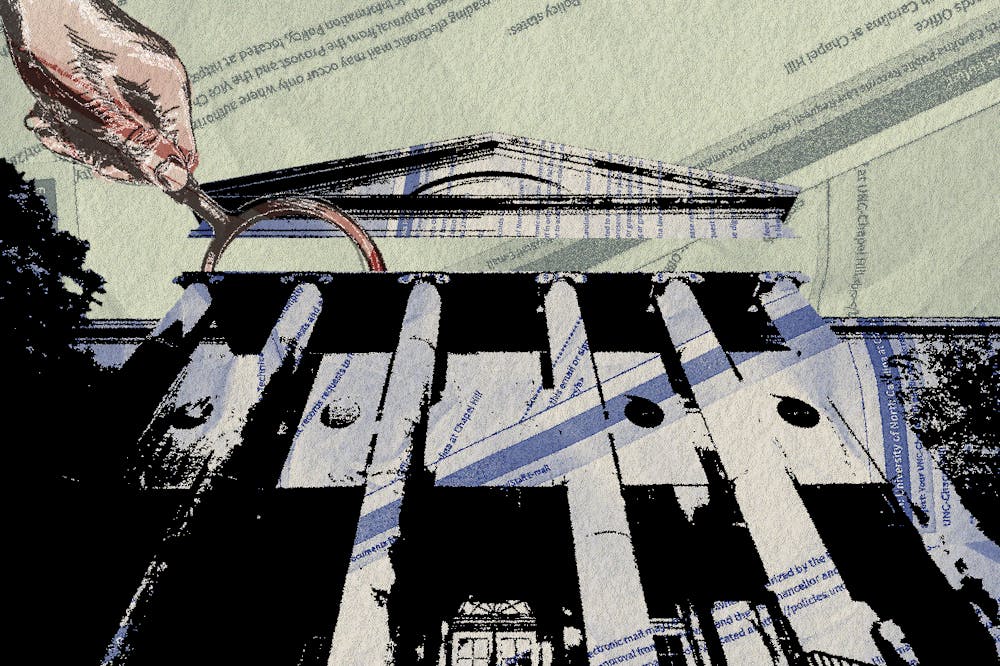The agreement, which the University said was confidential, was published in the N&O earlier that month.
On July 16, two days after the agreement was published, Vice Chancellor of Development David Routh gave a statement through University Communications saying a leak of confidential donor information was “seriously troubling and will be investigated.”
“Honoring these commitments is vital and critically important for maintaining trust with our donor community,” Routh wrote.
Over the summer — as the University made national news for its initial failure to offer journalist Nikole Hannah-Jones a tenured position in the journalism school — Kreiss believed he was one of a mere handful of faculty members who had been asked to sit for questioning.
But with the new documents, journalism school associate professor Ryan Thornburg calculated that the inquiry might have targeted up to 22 people.
“It indicates that this was not just a performance for donors,” he said. “It indicates that there was some real effort that was put into going deeper after the surface was scratched. Somebody said, ‘That’s not enough.’”
The public records have initiated yet another conversation at UNC about privacy, undue influence and trust between administration and faculty.
In a Friday meeting of the Faculty Council and general faculty, Chancellor Kevin Guskiewicz and Provost Chris Clemens offered remarks and answered questions about the email inquiry.
But there was one question Thornburg asked that wasn’t clearly answered by the end of the conversation: “What was the scope and justification for the access?”
'This is '1984’'
On a Tuesday in August, journalism associate professor Deb Aikat opened his laptop for another Zoom meeting.
Of the known people who were asked to sit for questioning, he was the only one who agreed.
To get the day's news and headlines in your inbox each morning, sign up for our email newsletters.
During the meeting, Aikat said, he was asked how he came to know of the donor agreement and if he had forwarded the donor agreement to any other colleagues.
“This is '1984,'” he said. “What amazes me is that the UNC leaders are just looking the other way.”
In Friday’s meeting, Clemens, who was not serving as UNC’s provost at the time, said the inquiry into Hussman employee emails was about security for records, such as donor agreements, that are stored on the University’s Database for Advancing our Vision of Institutional Excellence, or DAVIE, system.
The system serves as UNC's confidential alumni and development database, and includes information on private contributions, memberships and other data for "exclusive use of the fundraising and friendraising staff at Carolina," according to its confidentiality agreement.
“As I understand the investigation — which is over by the way, there is no open investigation — it was not to look for misconduct by individuals,” Clemens said. “It was to try to establish what needed to be done to protect or enhance the security of that DAVIE system.”
Following Clemens’ remarks, Guskiewicz followed up: “I want to be clear that there was no investigation. This was an inquiry.”
The new records also showed that former Provost Bob Blouin gave approval for the inquiry — an involvement that was also not previously known to the public.
In addition to emails, the documents made clear that as part of the inquiry, Kara Simmons, associate vice chancellor and senior University counsel, had requested access to Microsoft 365 cloud storage.
These details in the documents have raised questions about the University’s transparency and next steps for UNC’s Privacy of Electronic Information Policy.
The policy states that the University “does not inspect or monitor electronic mail routinely,” but provides a list of seven purposes for which designated officials can access and read emails on UNC’s network of computers. The purposes include investigating unauthorized access, violations of University policy and reports of employee misconduct.
During the meeting, and in an April 12 statement to the DTH, Clemens spoke about the potential need to revisit and revise the policy, which is issued by the Office of University Counsel.
"I want to assure faculty and staff that everyone in the offices of the Provost and University Counsel takes their privacy very seriously," Clemens wrote.
The policy was last revised in 2002. The UNC Office of Institutional Integrity and Risk Management has a review and approval process for existing policies, and the University has a policy framework that mandates a comprehensive review of policies at least every three years.
“They need to think about how you bring policy in alignment with those broader goals to make this a successful place and a successful institution,” Kreiss said. “Another thing that I would love to see is more broadly about the transparency of donor agreements, as well as clear donor guidelines.”
Aikat said the email inquiry has had a direct impact on faculty, making some feel enraged and afraid.
“It has a chilling effect on all of us,” he said. “And truth be told, the University has not given us any assurance that, hey, you know this was an error, or this was an exception.”
Now, many journalism school professors want to see the full version of the released documents, complete with the names of those who were targeted and the justification for requesting access to their emails and hard-drive backups.
“That would have some increased trust, I think, if we could see the unredacted portion,” Thornburg said at the Friday meeting.
For Kreiss, the email inquiry brings up considerations that have yet to be addressed: How much does University administration learn from controversies like this? How will it impact faculty research and retention? What environment does it create for students?
“Those are big question marks,” he said.
@praveenavsoma
university@dailytarheel.com




